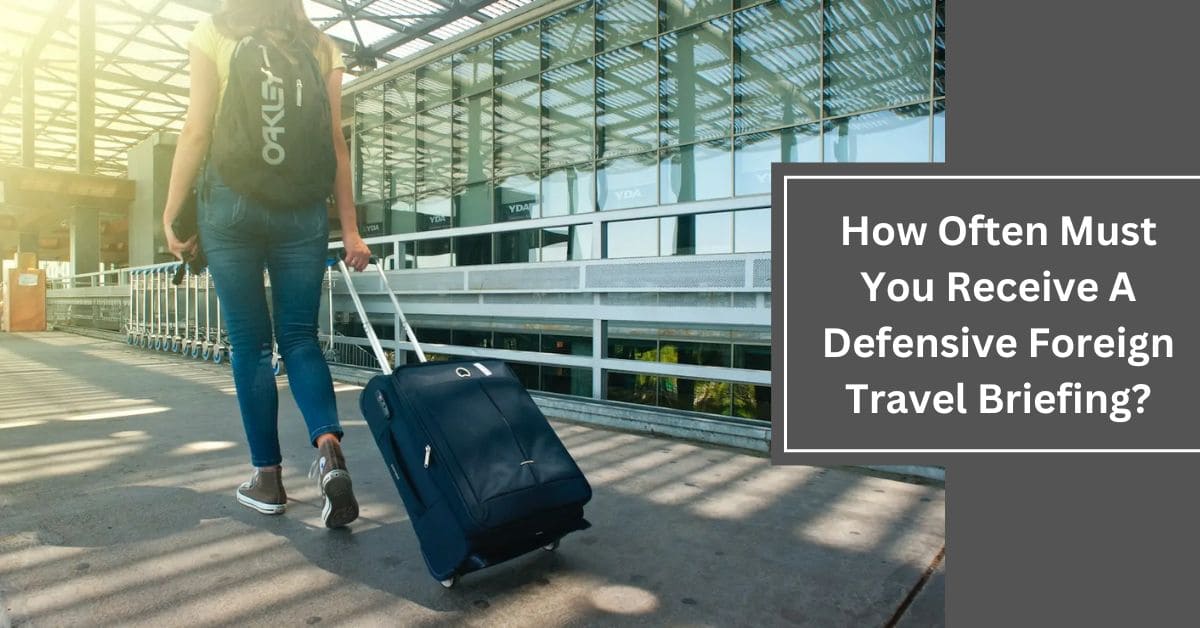How Often Must You Receive A Defensive Foreign Travel Briefing? – Let’s Find Out!
Before embarking on international travel, especially to potentially hazardous areas, it’s crucial to be prepared for potential risks.
You should How Often Must You Receive A Defensive Foreign Travel Briefing before every international trip, especially if traveling to high-risk areas or if significant time has elapsed since your last briefing.
What Is A Defensive Foreign Travel Briefing? – Let’s Explore Now!
A Defensive Foreign Travel Briefing (DFTB) is a crucial session that provides essential information to individuals traveling abroad. It aims to educate travelers about potential risks, safety measures, and protocols to follow in unfamiliar and potentially hazardous environments.

During a DFTB, are informed about local laws, customs, and potential threats specific to their destination. This briefing equips travelers with the knowledge and skills needed to make informed decisions and navigate foreign environments safely.
DFTBs typically cover a wide range of topics, including health and medical considerations, emergency contacts, and security protocols. They may also include practical tips on how to stay safe and avoid risky situations while traveling abroad.
A defensive Foreign Travel Briefing is designed to ensure the safety and security of the by providing them with the necessary information and tools to mitigate potential risks and handle challenging situations effectively.
Importance Of Defensive Foreign Travel Briefings – Learn More!
Defensive Foreign Travel Briefings (DFTBs) are incredibly important for anyone planning to travel abroad, especially to unfamiliar or potentially risky destinations.
These briefings provide essential information about the local laws, customs, and potential threats of the destination country. By understanding these factors, travelers can make informed decisions to ensure their safety and well-being.
DFTBs also cover crucial topics such as health and medical considerations, emergency contacts, and security protocols. This information helps travelers prepare for and respond to unexpected situations effectively.
Additionally, DFTBs often include practical tips on how to stay safe and avoid risky situations while abroad. the importance of Defensive Foreign Travel Briefings cannot be overstated. They are essential for ensuring the safety and security of travelers, allowing them to enjoy their trip with peace of mind.
Frequency Of Defensive Foreign Travel Briefings – Stay Informed, Stay Safe!

How Often You Receive A Defensive Foreign Travel Briefing depends on several factors, including the destination, the nature of the trip, and the individual’s level of experience.
In general, it is recommended to receive a DFTB before every international trip, especially if traveling to high-risk areas or if significant time has elapsed since the last briefing.
For individuals who frequently travel abroad, particularly to diverse or high-risk locations, more frequent briefings may be necessary. These individuals may benefit from regular updates on safety protocols, local laws, and emerging threats.
On the other hand, less frequent travelers or those visiting low-risk destinations may not require DFTBs as frequently. However, it is still advisable to undergo a briefing before any international trip to ensure that travelers are well-prepared and informed about potential risks and safety measures.
Ultimately, the frequency of DFTBs should be based on individual circumstances and the specific requirements of the trip, with the goal of ensuring the safety and security of travelers at all times.
Who Needs Defensive Foreign Travel Briefings? – Protect Your Journey!
Defensive Foreign Travel Briefings (DFTBs) are recommended for anyone planning to travel abroad, regardless of their destination or travel experience. However, certain individuals may benefit more from these briefings, including.
- First-time travelers: Individuals who are traveling abroad for the first time may not be familiar with the potential risks and challenges of international travel. DFTBs can help them understand what to expect and how to stay safe.
- Business travelers: Those traveling for business purposes often have busy schedules and may not have time to research their destination thoroughly. DFTBs can provide them with essential information to ensure a safe and productive trip.
- Students studying abroad: Students studying in a foreign country may face unique challenges, such as language barriers and cultural differences. DFTBs can help them navigate these challenges and stay safe while abroad.
- Tourists visiting high-risk areas: Travelers visiting destinations known for political unrest, natural disasters, or high crime rates should receive DFTBs to understand the risks and how to mitigate them.
- Government employees: Employees traveling on government business, especially to sensitive or high-risk areas, should undergo DFTBs to ensure their safety and security.
Read Also: Senators close to finishing encryption penalties
Factors Of Defensive Foreign Travel Briefings – Plan Ahead, Stay Secure!
Defensive Foreign Travel Briefings (DFTBs) cover a wide range of essential topics to ensure travelers are well-prepared for their international trips. The content of DFTBs typically includes.

- Local Laws and Customs: Information about the laws, regulations, and cultural norms of the destination country helps travelers avoid inadvertently breaking any laws or causing offense.
- Health and Medical Considerations: Guidance on vaccinations, health risks, and how to access medical care while abroad. This may include information on local diseases, food and water safety, and how to handle medical emergencies.
- Security Protocols: Advice on how to stay safe and secure while traveling, including tips on personal safety, avoiding scams and theft, and what to do in the event of an emergency or security threat.
- Emergency Contacts: Contact information for local authorities, embassies, consulates, and other relevant agencies that can provide assistance in case of an emergency.
- Cultural Sensitivity: Tips on how to respect local customs and traditions, including appropriate behavior, dress codes, and language etiquette.
- Travel Documentation: Information on visa requirements, passport validity, and other travel documents needed for entry into the destination country.
- Communication and Technology: Advice on how to stay connected while abroad, including information on local SIM cards, internet access, and communication apps.
- Transportation and Navigation: Tips on how to get around safely in the destination country, including information on public transportation, driving rules, and road conditions.
- Money Matters: Guidance on currency exchange, banking services, and how to protect against theft or loss of money and valuables.
- Risk Assessment: Information on potential risks and threats in the destination country, such as political unrest, natural disasters, or health hazards, and how to mitigate these risks.
Frequently Asked Questions:
1. How long does a Defensive Foreign Travel Briefing last?
The duration of a DFTB can vary depending on the content and the organization providing it. It usually lasts for many hours to a whole day.
2. Are Defensive Foreign Travel Briefings mandatory?
While DFTBs are not usually mandatory, they are highly recommended for anyone traveling abroad, especially to high-risk areas.
3. Can I attend a Defensive Foreign Travel Briefing online?
Yes, many organizations offer online DFTBs, which can be convenient for travelers who are unable to attend in person.
Conclusion:
Receiving a Defensive Foreign Travel Briefing before every international trip is essential for ensuring the safety and security of travelers. By staying informed and prepared, travelers can minimize risks and enjoy.
Read Also:







